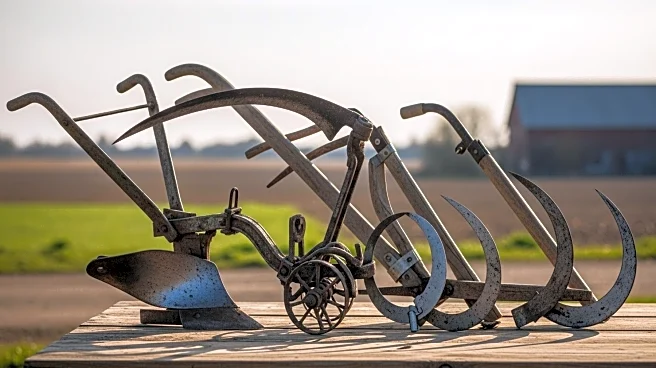What's Happening?
The Equipment Leasing & Finance Foundation's latest study highlights a shift in American farmers' approach to machinery due to the rising costs of new agricultural equipment. The study, titled 'Vertical Market Outlook Series: Agricultural Equipment,' reveals that many farmers are now choosing to retrofit older machines or purchase used equipment instead of investing in new models. This trend is driven by various factors, including market size, labor shortages, regulations, global trade, climate change, sustainability, and evolving consumer diets. Industry experts emphasize the importance of financial flexibility, noting that technological adoption and financial agility are becoming essential for farmers' survival and growth. The report also underscores the role of technology in precision farming and sustainability practices, while highlighting the ongoing concern of profitability.
Why It's Important?
The shift towards used and retrofitted equipment has significant implications for the U.S. agriculture industry. As farmers seek cost-effective solutions to maintain operations, this trend could lead to changes in the agricultural equipment market, affecting manufacturers and dealers. The emphasis on financial flexibility and technological adoption suggests a potential increase in demand for innovative solutions that enhance efficiency without substantial financial outlay. This could drive advancements in precision farming technologies and sustainability practices, impacting the industry's overall approach to resource management and environmental stewardship. Additionally, the focus on retrofitting and used equipment may influence the secondary market, creating opportunities for businesses specializing in equipment refurbishment and resale.
What's Next?
Farmers are likely to continue exploring cost-effective strategies to manage expenses while upgrading efficiency. This may involve increased collaboration with equipment manufacturers to develop affordable retrofitting solutions and enhanced support for the used-equipment market. As financial agility becomes more critical, stakeholders in the agriculture industry might advocate for policy changes that support technological innovation and sustainability practices. The ongoing challenges related to labor shortages, climate change, and evolving consumer diets will likely drive further adaptation in farming strategies, potentially leading to new business models and partnerships aimed at addressing these issues.
Beyond the Headlines
The trend towards used and retrofitted equipment raises ethical and environmental considerations. While retrofitting can extend the lifespan of machinery, it also necessitates careful management of resources to ensure sustainability. The focus on financial agility and technological adoption may prompt discussions on equitable access to advanced farming technologies, particularly for smaller farms that may struggle with the initial investment. Additionally, the shift in equipment strategies could influence cultural perceptions of farming, highlighting the industry's resilience and adaptability in the face of economic pressures.








